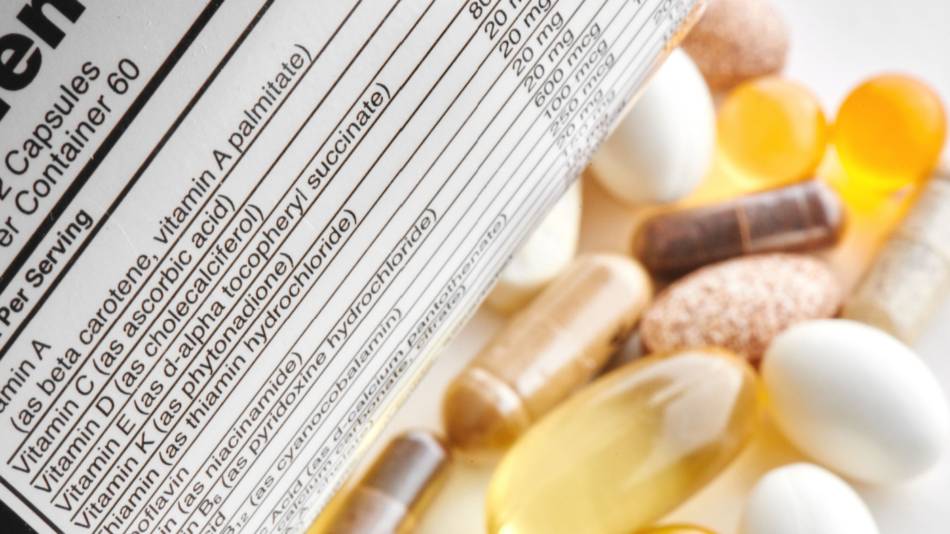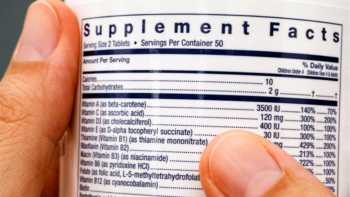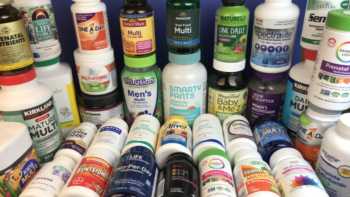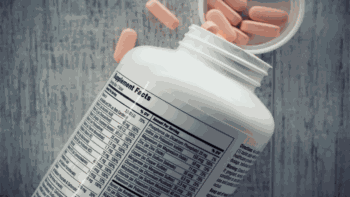Our Members Asked:
What are "broad-spectrum micronutrient" supplements, and do they have greater health benefits than multivitamin/multimineral supplements?

Answer:
The term "broad-spectrum micronutrients" appears to be a marketing term being used to describe supplements that contain all, or nearly all, essential vitamins and minerals that you need in small amounts. But so do many multivitamin/multimineral supplements and, usually, at lower cost.
Both types of products would typically provide about 100% or more of the Daily Value of essential micronutrients (those needed at microgram or low milligram amounts), and smaller percentages of the Daily Values of macronutrient minerals (potassium, phosphorus, calcium, and magnesium), for which relatively large amounts (hundreds or thousands of milligrams) need to be consumed daily (preferably from food).
Below, we compare one "broad-spectrum micronutrient" supplement, Daily Essential Nutrients by Hardy Nutritionals, to a general multivitamin for adults, Kirkland Signature (Costco) Daily Multi, which was our Top Pick general multivitamin for adults in 2021.
In short, Kirkland's provides at least 100% of the recommended daily intake of most vitamins and minerals without exceeding any Tolerable Upper Intake Levels (ULs). Hardy Nutritionals' Daily Essential Nutrients, which is marketed as a "clinical-strength broad-spectrum micronutrient," contains even higher amounts of most nutrients (like a "megadose" multivitamin/multimineral), but this does not necessarily make it better and certainly not safer — although, fortunately, it does not exceed ULs. Most Americans are not deficient in the vitamins and minerals provided in higher amounts in Daily Essential Nutrients. For instance, Daily Essential Nutrients contains more than 5 times as much vitamin E as Kirkland, but vitamin E deficiency affects less than 1% adults in the U.S.
Most striking is the difference in cost between these products: Kirkland costs about 4 cents per day ($19.99 for 500 daily tablets). Daily Essential Nutrients costs about $1.50 per day ($44.95 for 30 daily servings of 4 capsules).
Daily Essential Nutrients claims to be "clinical strength." The significance of this is not clear, but the term may relate to the fact that an iteration of the product was used in at least two small clinical trials that suggested modest and limited benefits in people with ADHD (Rucklidge, J Child Psychol Psychiatry 2018) and for people trying to quit smoking (Reihana, Nicotine Tob Res 2019). On the other hand, a study among adults (average age 38) with self-reported symptoms of anxiety and depression showed that taking 4 capsules (a suggested serving) of Daily Essential Nutrients three times daily for 10 weeks did not increase the percentage of participants who achieved clinically significant improvements compared to placebo. Those in the supplement group appeared to improve more quickly than the placebo group but were also more likely to report diarrhea (Blampied, J Affect Disord 2023).
A potential advantage of Daily Essential Nutrients relates to magnesium. Kirkland provides 100 mg as magnesium oxide, which is not absorbed as well as chelated forms, such as magnesium bisglycinate chelate, or magnesium citrate, and is more likely to have a laxative effect. Daily Essentials Nutrients provides 200 mg of magnesium in a chelated form, although it does not specify the type of chelate. The label only says that the magnesium is part of a "chelation complex" — as are all of the other minerals in the supplement. Is this worth the extra cost of Daily Essential Nutrients? Probably not. ConsumerLab has found that you can get 200 mg of high-quality magnesium as magnesium citrate from a supplement for as little as 8 cents.
Interestingly, Daily Essential Nutrients provides only 4.6 mg of iron, which is only about half the recommended daily allowance for men and older women (8 mg) and much lower than the requirements for women under 51 (18 mg) or who are pregnant (27 mg). In contrast, Kirkland provides 18 mg — which is more than needed by older adults need but appropriate for younger women and adolescents. Daily Essential Nutrients also provides less iodine than Kirkland (45% vs. 100% of the Daily Value), although it does provide a small amount of choline, while Kirkland has none.
Comparison of Vitamins and Minerals in Kirkland Signature Daily Multi versus Daily Essential Nutrients
| Kirkland Signature (Costco) Daily Multi Amount per serving % DV |
Hardy Nutritionals' Daily Essential Nutrients Amount per serving % DV |
|
| Vitamin A | 1,050 mcg RAE (29% as beta-carotene) 117% |
576 mcg (as retinyl palmitate) 64% |
| Vitamin C | 90 mg 100% |
200 mg (as ascorbic acid) 222% |
| Vitamin D | 10 mcg (as cholecalciferol) 50% |
24 mcg (as cholecalciferol) 120% |
| Vitamin E | 13.5 mg 90% |
78 mg (as D-alpha tocopheryl succinate) 520% |
| Vitamin K | 25 mcg (as K1) 21% |
40 mcg (as K1 and K2) 33% |
| Thiamin (vitamin B-1) | 1.5 mg 125% |
20 mg 1,667% |
| Riboflavin (vitamin B-2) | 1.7 mg 131% |
6 mg 462% |
| Niacin (vitamin B-3) | 20 mg (as niacinamide) 125% |
30 mg (as niacinamide) 188% |
| Pantothenic acid (vitamin B-5) | 10 mg 200% |
10 mg (as D-calcium pantothenate) 200% |
| Pyridoxine (vitamin B-6) | 2 mg 118% |
23.3 mg (as pyridoxine hydrochloride) 1,372% |
| Biotin (vitamin B-7) | 30 mcg 100% |
360 mcg 1,200% |
| Folate (vitamin B-9) | 833 mcg DFE 208% |
444 mcg DFE (as calcium L-5-methyltetrahydrofolate) 111% |
| Cobalamin (vitamin B-12) | 6 mcg 250% |
300 mcg (as adenosylcobalamin and methylcobalamin) 12,500% |
| Choline | NA | 64 mg (as bitartrate) 12% |
| Calcium | 200 mg (as dicalcium phosphate, calcium carbonate) 15% |
440 mg (as NutraTekTM chelation complex) 34% |
| Iron | 18 mg (as ferrous fumarate) 100% |
4.6 mg (as NutraTekTM chelation complex) 25% |
| Phosphorus | 109 mg 9% |
280 mg (as NutraTekTM chelation complex) 22% |
| Iodine | 150 mcg 100% |
68 mcg (as NutraTekTM chelation complex) 45% |
| Magnesium | 100 mg (as magnesium oxide) 24% |
200 mg (as NutraTekTM chelation complex) 48% |
| Zinc | 11 mg (as zinc oxide) 100% |
16 mg (as NutraTekTM chelation complex) 145% |
| Selenium | 55 mcg 100% |
68 mcg (as NutraTekTM chelation complex) 124% |
| Copper | 0.9 mg (as cupric sulfate) 100% |
2.4 mg (as NutraTekTM chelation complex) 267% |
| Manganese | 2.3 mg 100% |
3.2 mg (as NutraTekTM chelation complex) 139% |
| Chromium | 35 mcg 129% |
208 mcg (as NutraTekTM chelation complex) 594% |
| Molybdenum | 45 mcg 100% |
48 mcg (as NutraTekTM chelation complex) 107% |
| Potassium | 80 mg (as potassium chloride) 2% |
80 mg (as NutraTekTM chelation complex) 2% |
| Other ingredients | Chloride 72 mg, silicon 2 mg, boron 150 mcg, vanadium 10 mcg, lycopene 300 mcg, lutein 250 mcg | 360 mg of a proprietary blend of alpha-lipoic acid, inositol, shilajit extract, acetyl-L-carnitine, Atlantickelp, grape seed extract, ginkgo biloba leaf extract, N-acetyl-L-cysteine, L-methionine, lithium orotate, trace minerals as NutraTek chelation complex: boron, vanadium, nickel |
Join today to unlock all member benefits including full access to all CL Answers and over 1,400 reviews.
Join NowAlready a member? Sign In Here.
Join now at www.consumerlab.com/join/













Submit your comment
This feature is restricted to active members.
Join now to add comments and get all member benefits, including over 1,400 reviews.
Join NowAlready a member? Sign in here.